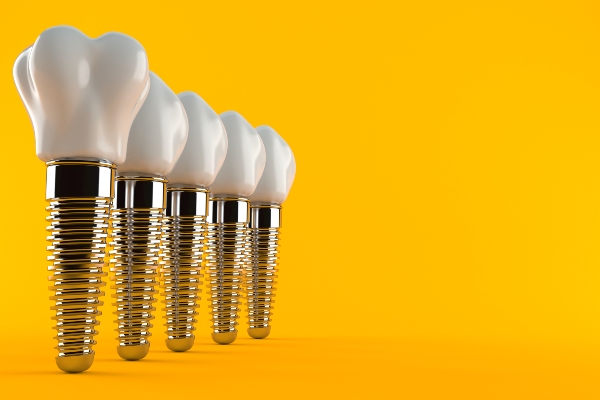 Dental implants are the most stable dental restorations you can get. The invasive procedure will cut through your gum tissue. The dentist will drill into the jawbone and place titanium rods into the holes. The right kind of care is important to make sure that the implant site is free from infections. Here are the three tips for aftercare when you get your dental implants.
Dental implants are the most stable dental restorations you can get. The invasive procedure will cut through your gum tissue. The dentist will drill into the jawbone and place titanium rods into the holes. The right kind of care is important to make sure that the implant site is free from infections. Here are the three tips for aftercare when you get your dental implants.
1. Treat the pain and swelling
Tissue pain and inflammation are common after surgery. The patient will feel these effects after the anesthetic fades. The swelling will be more pronounced as days pass. It could worsen over the first two or even three days. This may seem alarming, but these effects are treatable. The dentist will prescribe medications to help with the patient’s recovery after getting dental implants.
A cold compress can help reduce the pain and swelling as well. Using this while taking medications can ease the discomfort even more. Proper rest can help reduce the pressure in the mouth. Refraining from lifting anything heavy or performing any strenuous activities can help keep the pain and swelling down.
2. Stay away from hot drinks and foods
Aftercare starts right after the implant surgery. Avoid hot drinks and foods. Doing so is one of the most important parts of aftercare for dental implants. Hot foods and drinks can put stress on the surgical site. Disturbing the implant site’s healing can expose the area to more infections.
Cold drinks and foods are ideal during this time. The cold can bring down pain and swelling as the mouth heals. Drinking cold water during the first one to two days can reduce discomfort. This can reduce bleeding, allowing the site to recover and the implants to merge with the gum tissue and jawbone.
3. Perform proper oral hygiene
Brushing the teeth is ideal after the procedure. It is important to clean them well, especially around the implant site. The area around the site will be sensitive, so do so with care. Dentists recommend using a small-headed toothbrush with soft bristles. This must start the night after getting the dental implants and must continue every day.
Remember that brushing must always be gentle. The gum tissue around the implant sites is still sensitive and tender. The dental implants are still unstable. Heavy brushing may dislodge the implant or cause bleeding.
The patient can wait a few days before brushing around the implant site. Flossing every day is important. But the patient must wait for the dental implants to stabilize first before doing this. Asking the dentist about proper dental care is always a good idea. Guidance can help the patient get closer to the success of the dental implants.
The mentioned three aftercare tips for dental implants can lead to their possible success
Dental implants can help restore and improve your dental health. The surgery is invasive. That is why proper aftercare is necessary. Following the mentioned tips can help. Working with your dentist can help guide you in caring for your new dental implants.
Request an appointment or call Dr. Robert B Tamaki, DDS at 310-402-0156 for an appointment in our Los Angeles office.
Related Posts
Dental implants are small, titanium screws placed into the jawbone where a tooth was removed. The implant fuses with the jawbone over time and supports a crown, bridge, or denture. This article will review six warning signs that it is time to inquire about dental implants.Many people (adults) postpone receiving treatment after losing a tooth…
Having dental implants can correct tooth loss, which is the primary reason for getting these dental replacements. Other reasons for getting them may determine if you are a good candidate for this treatment. Knowing if you are a good candidate for dental implants can help you prepare well for your next appointments. Here are the…
Studies show that dental implants remain the gold standard in dental restorations. These dental replacements are the most stable ones that you can get. It may be invasive, but once it heals well, you will have good dental function again. Here are the details about the process of getting dental implants.The dentist will examine the…
